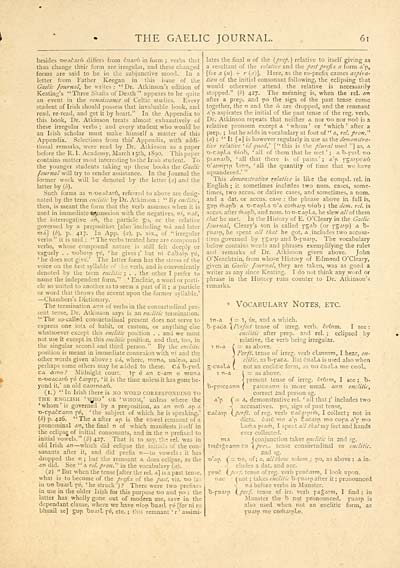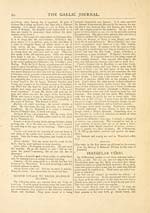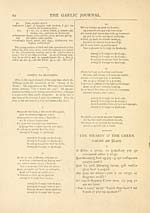Download files
Complete book:
Individual page:
Thumbnail gallery: Grid view | List view

THE GAELIC JOURNAL.
6i
besides Tje^vcAiu differs from chäió in form ; verbs thnt
thus change their form are irregular, and these clianged
forms are said to be in the subjunctive mood. In a
letter from Father Keegan in this issue of the
Gaelic fournal, he writes: "Dr. Atkinson's edition of
Keating's "Three Shafts of Deatli " appears to be quite
an event in the renaissance of Celtic studies. Every
student of Irish should possess that invaUiable book, and
re.ad, re-read, and get it by heart." In the Appendix to
this book, Dr. Atkinson treats almost exhaustively of
these irregular verbs ; and every student who would be
an Irish scholar must make himself a master of this
Appendix. Selections from this" Appendix, with addi-
tional remarks, were read by Dr. Atkinson as a paper
before the R. I. Academy, March 15th, 1890. This paper
contains matter most interesting to the Irisii student. To
the younger students taking up these books the Gaelic
/oiintal will try to render assistance. In the Journal the
former work will be denoted by the letter (a) and the
latter by (t>).
Such forms as n-oeiCAfo, referred to above are desig-
nated by the term enclitic by Dr. Atkinson : " By enclitic,
then, is meant the form that the verb assumes when it is
used in immediate fwmexion with the negatives, iii, 11 ac,
the interrogative jri, the particle 50, or the relative
governed by a preposition [also including x>Á and later
m&\ {/>), p. 417. In App. [a), p. xix., of "irregular
verbs " it is said : " The verbs treated here are comiiound
verbs, whose compound nature is still felt deeply or
vaguely . . noljeiiv fé, ' he gives ;' but 111 co,bâip ^-é,
' he does not give.' The latter form has the stress of the
voice on the first syllable of :l:e verb, and is conveniently
denoted by tlie term eiulitu ; . . the other I prefer to
name the independent form." ' Enclitic, a word or parti-
cle so united to another as to seem a part of it ; a particle
or word that throws the accent upon the former syllable.'
— Chambers's Dictionary.
The termination iiin of verbs in the consuetudinal pre-
sent tense, Dr. Atkinson says is an enclitic termination.
"The so-called consuetudinal present does not serve to
express one iota of habit, or custom, or anything else
whatsoever except this enclitic position . . and we must
not use it except in this enclitic position, and that, too, in
the singular second and third person." By the enclitic
position is meant in immediate connexion with iii and the
other words given above : ci, where, tiiuriA, unless, and
perhaps some others may be added to these. CÍ b-jruib
CA <liiie? Midnight court. If é Ati c-<im e mutiA
ii-T)eACAi-ô \é cAipip, 'it is the time unless it has gone be-
yond it,' an old CAoineAw.
(i.) " In Irish there is NO WORD corresponding to
THE ENGLISH ' \yio ' OR 'WHOM,' unless where the
' whom ' is governed by a preposition, as ah nm A]\ a
u-civACCAiin )-é, ' the subject of which he is speaking,'
(Í) p. 426. "The A after Ap is the vowel remnant of a
pronominal Ati, the final n of which manifests itself in
the eclipse of initial consonants, and in the 11 prefixed to
initial vowels." [b) 427. That is to say. the rel. was in
old Irish All — which did eclipse the initials of the con-
sonants after it, and did prefix 11 — to vowels : it has
dropped the 11 ; but the remnant a does eclipse, as the
An did. See "a rel. pron." in the vocabulary (a).
(2) " But when the tense [after the rel. a] is a past tense,
what is to become of the prefix of the past, \\z. no (a;
in -oo buAiL Té, ' he struck ') ? There were two prefixes
in use in the older Irish for this purpose -oo and i\o : the
latter has wholly gone out of modern use, save in the
dependant clause, where we have niop buAil fé [for ni ro
bhuail se] gup buAil pé, etc. ; this remnant ' r ' assimi-
lates the final « of the (pirp. ) relative to itself giving as
a resultant of the relative and the post prefix a form &'\t,
[for a («) + r (0)]. Here, as the ro-prefix causes aspira-
tion of the initial consonant following, the eclipsing that
would otherwise attend the relative is necessarily
stopped." (h) 427. The meaning is, when the rel. An
after a prep, and po the sign of the past tense come
together, the 11 and the ó are dropped, and the remnant
a'p aspirates the initial of the past tense of the reg. verb.
Dr. Atkinson repeats that neither a nor x>o nor 1106 is a
relative pronoun except a ' whom ' or ' which ' after a
prep. ; butheaddsin vocabulary at foot of "a, rel. pron."
{a): " It [a] is however regularly in use as the demonstra-
tive relative ' iJ quod,' ["this is the plural u%eA "] as, a
■o-CApbA •oiob, ' all of them that he met ' ; A b-puib t)o
piAnAib, 'all that there is of pains'; A'p psAipcAO
■o'Aimpp linn, 'all the quantity of time that we have
squandered.' "
This demonstrative relative is like the compd. rel. in
English ; it sometimes includes two nom. cases, some-
times, two accus. or dative cases, and sometimes, a nom.
and a dat. or accus. case : the phrase above in full is,
gup liiApb A TJ-cwpiA ci'a coiiiAip T)iob ; the dem. rel. is
accus. after til Apb, and nom. tou-CAplA, he slew a// of theni
that he met. In the History of E. O'Cleary in the Gaelic
Journal, Cleary's son is called pjAb (or VJAip) a b-
fUAip, he spent all that he got, A includes two accusa-
tives governed by VgAip and b-pUAi|\. The vocabulary
below contains words and phrases exemplifying the rules
and remarks of Dr. Atkinson given above. John
0'Ne.ichtain, from whose Histoiy of Edmond O'Cleary,
given in Gaelic lonr>ial, they are taken, was as good a
writer as any since Keating. I do not think any wnrd or
phrase in the Histoiy runs counter to Dr. Atkinson's
remarks.
• Vocabulary Notes, etc
1n-A (= 1, in, and A which.
b-jTAcA (Perfect tense of irreg. verb, citum. I see :
enclitic after prep, and rel. ; eclipsed by
relative, the verb being irregular.
1 n-A f = as above.
Perft. tense of irreg. verb cbuiium, I hear, en-
clitic, as b-pACA. But cuaIa is used also when
5-cuAbA \ not an enclitic form, as ■00 cuaLa me ceoU
1 n-A ( = as above.
< present tense of irreg. ciwim, I see ; li-
b-feiceAnn ( jrAiccAnn is more usual. Ann enclitic,
correct 2nd person sg.
a'p (— a, demonstrative rel. ' all that ;' includes two
■I accusatives, po, sign of past tense,
CACAip {^pcrft. of reg. verb t;ACAipirii, I collect; not in
diets. cAic me A'p CACAtp mo copA A'p mo
bAtiiA piAtii, I spent all thatmy feet and hands
ever collected.
niA (conjunction takes ir«fŴ/V in 2nd sg.
ItncigeAnn cu i/n-s.. tense consuetudinal or enclitic.
2nd sg.
■d'ap i'= tie, of; a, all those whom ; po, as above : A in-
-J eludes a dat. and ace.
peuc (per/, tense of reg. verb feucAitn, I look upon.
'not ; takes í«í///ìVb-puAip after it; pronounced
' before verbs in Munster.
tense of irr. verb pAgAini, I find : in
Munster the b not pronounced, puAip is
also used when not an enclitic form, as
jrUAip me comAipie.
peuc yper/. lens
nAC (not ; t
4 nÁl
b-puAip (per/.
6i
besides Tje^vcAiu differs from chäió in form ; verbs thnt
thus change their form are irregular, and these clianged
forms are said to be in the subjunctive mood. In a
letter from Father Keegan in this issue of the
Gaelic fournal, he writes: "Dr. Atkinson's edition of
Keating's "Three Shafts of Deatli " appears to be quite
an event in the renaissance of Celtic studies. Every
student of Irish should possess that invaUiable book, and
re.ad, re-read, and get it by heart." In the Appendix to
this book, Dr. Atkinson treats almost exhaustively of
these irregular verbs ; and every student who would be
an Irish scholar must make himself a master of this
Appendix. Selections from this" Appendix, with addi-
tional remarks, were read by Dr. Atkinson as a paper
before the R. I. Academy, March 15th, 1890. This paper
contains matter most interesting to the Irisii student. To
the younger students taking up these books the Gaelic
/oiintal will try to render assistance. In the Journal the
former work will be denoted by the letter (a) and the
latter by (t>).
Such forms as n-oeiCAfo, referred to above are desig-
nated by the term enclitic by Dr. Atkinson : " By enclitic,
then, is meant the form that the verb assumes when it is
used in immediate fwmexion with the negatives, iii, 11 ac,
the interrogative jri, the particle 50, or the relative
governed by a preposition [also including x>Á and later
m&\ {/>), p. 417. In App. [a), p. xix., of "irregular
verbs " it is said : " The verbs treated here are comiiound
verbs, whose compound nature is still felt deeply or
vaguely . . noljeiiv fé, ' he gives ;' but 111 co,bâip ^-é,
' he does not give.' The latter form has the stress of the
voice on the first syllable of :l:e verb, and is conveniently
denoted by tlie term eiulitu ; . . the other I prefer to
name the independent form." ' Enclitic, a word or parti-
cle so united to another as to seem a part of it ; a particle
or word that throws the accent upon the former syllable.'
— Chambers's Dictionary.
The termination iiin of verbs in the consuetudinal pre-
sent tense, Dr. Atkinson says is an enclitic termination.
"The so-called consuetudinal present does not serve to
express one iota of habit, or custom, or anything else
whatsoever except this enclitic position . . and we must
not use it except in this enclitic position, and that, too, in
the singular second and third person." By the enclitic
position is meant in immediate connexion with iii and the
other words given above : ci, where, tiiuriA, unless, and
perhaps some others may be added to these. CÍ b-jruib
CA <liiie? Midnight court. If é Ati c-<im e mutiA
ii-T)eACAi-ô \é cAipip, 'it is the time unless it has gone be-
yond it,' an old CAoineAw.
(i.) " In Irish there is NO WORD corresponding to
THE ENGLISH ' \yio ' OR 'WHOM,' unless where the
' whom ' is governed by a preposition, as ah nm A]\ a
u-civACCAiin )-é, ' the subject of which he is speaking,'
(Í) p. 426. "The A after Ap is the vowel remnant of a
pronominal Ati, the final n of which manifests itself in
the eclipse of initial consonants, and in the 11 prefixed to
initial vowels." [b) 427. That is to say. the rel. was in
old Irish All — which did eclipse the initials of the con-
sonants after it, and did prefix 11 — to vowels : it has
dropped the 11 ; but the remnant a does eclipse, as the
An did. See "a rel. pron." in the vocabulary (a).
(2) " But when the tense [after the rel. a] is a past tense,
what is to become of the prefix of the past, \\z. no (a;
in -oo buAiL Té, ' he struck ') ? There were two prefixes
in use in the older Irish for this purpose -oo and i\o : the
latter has wholly gone out of modern use, save in the
dependant clause, where we have niop buAil fé [for ni ro
bhuail se] gup buAil pé, etc. ; this remnant ' r ' assimi-
lates the final « of the (pirp. ) relative to itself giving as
a resultant of the relative and the post prefix a form &'\t,
[for a («) + r (0)]. Here, as the ro-prefix causes aspira-
tion of the initial consonant following, the eclipsing that
would otherwise attend the relative is necessarily
stopped." (h) 427. The meaning is, when the rel. An
after a prep, and po the sign of the past tense come
together, the 11 and the ó are dropped, and the remnant
a'p aspirates the initial of the past tense of the reg. verb.
Dr. Atkinson repeats that neither a nor x>o nor 1106 is a
relative pronoun except a ' whom ' or ' which ' after a
prep. ; butheaddsin vocabulary at foot of "a, rel. pron."
{a): " It [a] is however regularly in use as the demonstra-
tive relative ' iJ quod,' ["this is the plural u%eA "] as, a
■o-CApbA •oiob, ' all of them that he met ' ; A b-puib t)o
piAnAib, 'all that there is of pains'; A'p psAipcAO
■o'Aimpp linn, 'all the quantity of time that we have
squandered.' "
This demonstrative relative is like the compd. rel. in
English ; it sometimes includes two nom. cases, some-
times, two accus. or dative cases, and sometimes, a nom.
and a dat. or accus. case : the phrase above in full is,
gup liiApb A TJ-cwpiA ci'a coiiiAip T)iob ; the dem. rel. is
accus. after til Apb, and nom. tou-CAplA, he slew a// of theni
that he met. In the History of E. O'Cleary in the Gaelic
Journal, Cleary's son is called pjAb (or VJAip) a b-
fUAip, he spent all that he got, A includes two accusa-
tives governed by VgAip and b-pUAi|\. The vocabulary
below contains words and phrases exemplifying the rules
and remarks of Dr. Atkinson given above. John
0'Ne.ichtain, from whose Histoiy of Edmond O'Cleary,
given in Gaelic lonr>ial, they are taken, was as good a
writer as any since Keating. I do not think any wnrd or
phrase in the Histoiy runs counter to Dr. Atkinson's
remarks.
• Vocabulary Notes, etc
1n-A (= 1, in, and A which.
b-jTAcA (Perfect tense of irreg. verb, citum. I see :
enclitic after prep, and rel. ; eclipsed by
relative, the verb being irregular.
1 n-A f = as above.
Perft. tense of irreg. verb cbuiium, I hear, en-
clitic, as b-pACA. But cuaIa is used also when
5-cuAbA \ not an enclitic form, as ■00 cuaLa me ceoU
1 n-A ( = as above.
< present tense of irreg. ciwim, I see ; li-
b-feiceAnn ( jrAiccAnn is more usual. Ann enclitic,
correct 2nd person sg.
a'p (— a, demonstrative rel. ' all that ;' includes two
■I accusatives, po, sign of past tense,
CACAip {^pcrft. of reg. verb t;ACAipirii, I collect; not in
diets. cAic me A'p CACAtp mo copA A'p mo
bAtiiA piAtii, I spent all thatmy feet and hands
ever collected.
niA (conjunction takes ir«fŴ/V in 2nd sg.
ItncigeAnn cu i/n-s.. tense consuetudinal or enclitic.
2nd sg.
■d'ap i'= tie, of; a, all those whom ; po, as above : A in-
-J eludes a dat. and ace.
peuc (per/, tense of reg. verb feucAitn, I look upon.
'not ; takes í«í///ìVb-puAip after it; pronounced
' before verbs in Munster.
tense of irr. verb pAgAini, I find : in
Munster the b not pronounced, puAip is
also used when not an enclitic form, as
jrUAip me comAipie.
peuc yper/. lens
nAC (not ; t
4 nÁl
b-puAip (per/.
Set display mode to: Large image | Transcription
Images and transcriptions on this page, including medium image downloads, may be used under the Creative Commons Attribution 4.0 International Licence unless otherwise stated. ![]()
| Early Gaelic Book Collections > Blair Collection > Gaelic journal > Volume 4, number 33 > (61) |
|---|
| Permanent URL | https://digital.nls.uk/79325231 |
|---|
| Description | No. 33, Vol. IV. 1889. |
|---|---|
| Shelfmark | Blair.217 |
| Attribution and copyright: |
|
| Description | A selection of books from a collection of more than 500 titles, mostly on religious and literary topics. Also includes some material dealing with other Celtic languages and societies. Collection created towards the end of the 19th century by Lady Evelyn Stewart Murray. |
|---|
| Description | Selected items from five 'Special and Named Printed Collections'. Includes books in Gaelic and other Celtic languages, works about the Gaels, their languages, literature, culture and history. |
|---|

